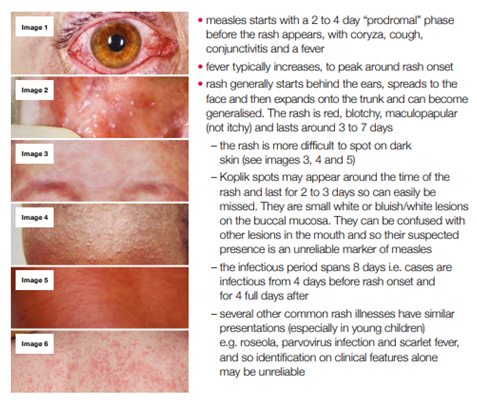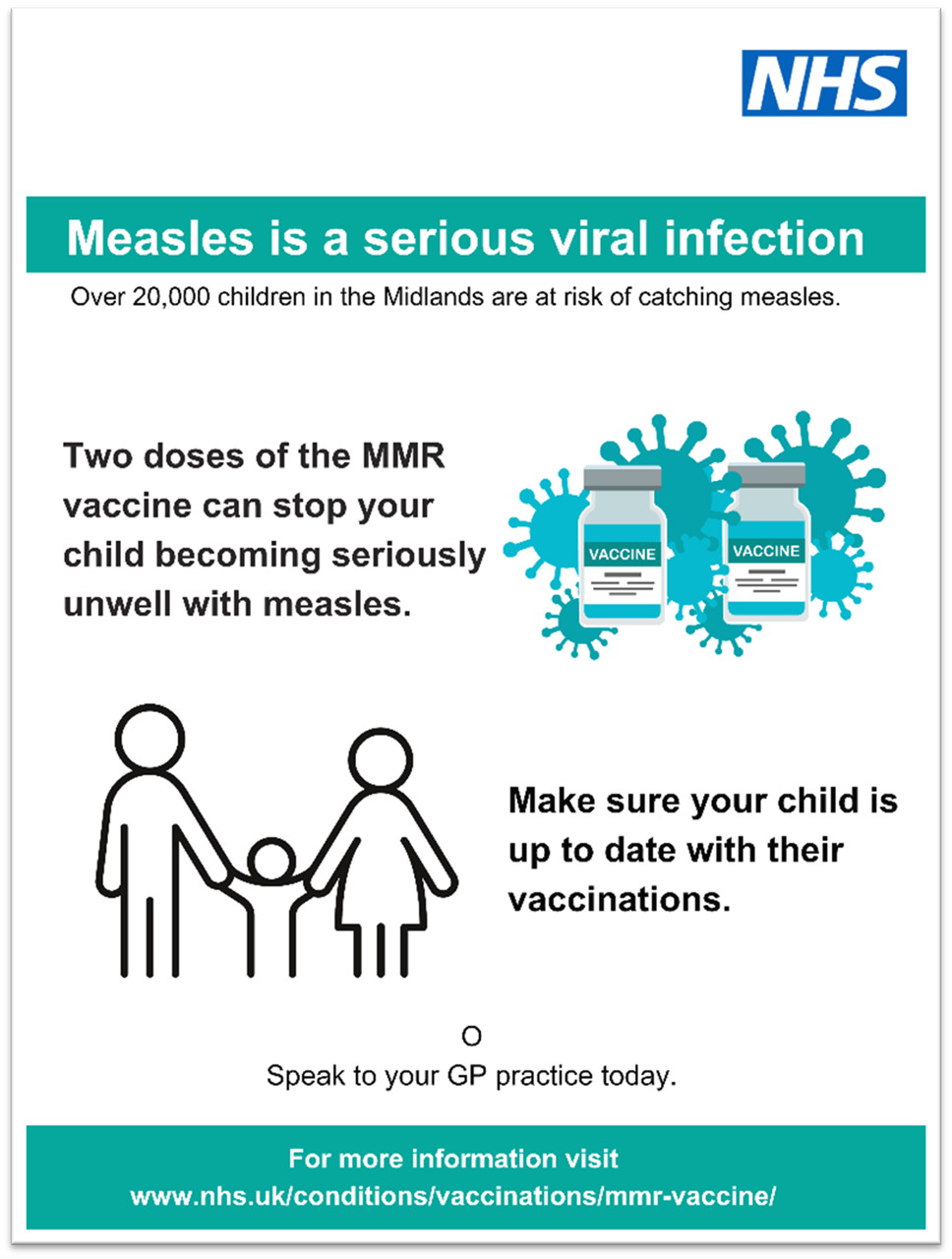Measles - Cases of Measles in the Midlands has risen
Measles
Measles cases are rising in the Midlands. There are two current outbreaks with young unvaccinated children presenting at healthcare settings.

FAQ's
1. Is the MMR vaccine safe?
All vaccines are thoroughly tested to make sure they will not harm you or your child. It often takes many years for a vaccine to make it through the trials and tests it needs to pass for approval. Once a vaccine is being used in the UK it's also monitored for any rare side effects by the Medicines and Healthcare Products Regulatory Agency (MHRA). It is alo carefully monitored to make sure it still works.
Common side effects include:
- redness at the injection site
- fever of 38 degrees or higher
- pain and swelling at the injection site
- fever higher than 39.5 degrees
- rash
- upper respiratory tract infection
A with any vaccine, medicine or food, there is a very small chance of a severe allergic reaction (anaphylaxis). Anaphylaxis is different from less sever allergic reactions because it causes life-threatening breathing and/or circulation problems. It is always extremely serious but can be treated with adrenaline. Healthcare workers who give vaccines know how to do this.
In the UK between 1997 and 2003 there were a total of 130 reports of anapylaxis following ALL immunisations. Around 117 million doses of vaccines were given in the UK during this period. This means that the overall rate of anaphylaxis is around 1 in 900,000.
2. My child has an allergy to egg, is it safe for them to have MMR?
All children with egg ellergy should receive the MMR vaccination as a routine procedure in primary care (Clark et al., 2010). Recent date suggest that anaphylactic reactions to MMR vaccine are not associated with hypersensitivity to egg antigens but to other components of the vaccine (such as gelatine) (Fox and Lack 2003). In three large studies with a combined total of over 1000 patients with egg allergy, no sever cardiorespiratory reactions were reported after MMR vaccination. Children who have had documented anaphylaxis to the vaccine itself should be assessed by an allergist.
3. Should I be worried about Austism?
There is no link between the MMR vaccine and austism. Austism is a developmental disorder which is usually diagnosed in preschool children. The originial research which suggested a link has now been discredited. The National Autistic Society in the UK has issued a statement saying that 'there is no link between austism and the MMR vaccine'.
4. Will the MMR 'overload' the immune system?
Studies have demonstrated that there are no harmful effects from administering multiple injections or vaccines in one session. Parents can also be reassured that offering multiple vaccines in this way is a routine occurrence around the world with no harmful effects being identified. Equally, there is no evidence to support arguments of "overloading" the immune system. From the moment a child is born, they are exposed to a huge number of bacteria and viruses on a daily basis which the immune system is able to cope with and, as a result, become stronger. Immunisation helps to improve our protection against harmful diseases at the very earliest opportunity, delaying immunisation inevitably delays protection.
5. Is catching the diseases better/safer than having the vaccine?
MMR immunisation is the safest way that parents can protect their children against these serious diseases. Measles, Mumps and Rubella are highly infectious and can lead to serious problems including meningitis, hearing loss and problems during pregnancy. Vaccines teach your immune system how to create antibodies that protect you from diseases. It's much safer for your immune system to learn this through vaccination than by catching the diseases and treating them. Once your immune system knows how to fight a disease, it can often give you lifelong protection. Catching measles would not protect you from mumps or rubella.
6. These diseases are no longer around in the UK, does my child really need the vaccination?
There is a large measle outbreak in the West Midlands (as of Jan 2024). Measles is one of the most highly communicable infectious diseases. Spending more than 15 minutes in direct contact with someone infected with measles is sufficient to transmit virus. It is spread through coughing and sneezing, close personal contact or direct contact with infected nasal or throat secretions. Measles can be serious, particuarly for people whose immune system is not working normally. The best way to prevent measles is through vaccination.
7. Can I have single vaccines instead?
Single vaccines for measles, mumps and rubella are not available on the NHS and are not recommended.
Combined vaccines like the MMR vaccine are safe and help to reduce the number of injections your child needs.
The benefits include:
- avoiding any delay between injections that could risk illness
- reducing discomfort for your child
- reducing the number of appointments needed
Some private clinics in the UK offer single vaccines against measles, mumps and rubella, but these vaccines are unlicensed. This means there are no checks on their safety and effectiveness. The NHS does not keep a list of private clinics.
8. My child has previously received single vaccines of Measles, Mumps and Rubella, do they still need MMR?
Single vaccines of Measles, Mumps and Rubella imported into this country have not been independently tested for potency. There is no evidence that some of the single vaccines are less effective in protecting against measles. Single dose vaccines are not part of the recommended 2 doses of MMR in the UK, children who have been vaccinated with single vaccines should be offered 2 doses of MMR at the recommended intervals and ages according to the UK schedule.
9. Is there a recommended Interval between an individual having measles and the administration of the MMR vaccine?
If the individual is well, there is no need to leave any specific interval between measles infection and administration of MMR.
If the individual is systematically unwell, MMR vaccination should be delayed in case the effects of measles disease are confused with adverse effects of the vaccine.

The MMR Vaccination Gives The Best Protection
You need two doses of the MMR vaccine to be fully protected against measles, mumps and rubella.
The NHS is urging parents to check that their children are up to date with their MMR (Measles, Mumps and Rubella) vaccinations as measles cases continue rising across the country. Measles is completely preventable with the MMR vaccine - two doses provide over 99% protection.
Ashis Banerjee, Screening and Immunisation Lead said: "The MMR vaccine is the safest and most effective way to protect our children and communities against measles".
To check if your child is up to date with their vaccinations check their red book or ask their GP practice. If any doses have been missed you can make an appointment at your GP practice to catch up and become protected.
The MMR vaccine is given at one year old and again at around three years and four months in readiness for starting school. Two doses are enough to give lifelong protection from becoming seriously unwell with mumps, measles and rubella. Anyone who has missed any of the vaccinations can catch up any time.
If you child has missed any of their MMR vaccines, please contact us today.

Symptoms To Look Out For
The number of young people catching measles has risen.
Measles is an infection that spreads very easily and can cause serious problems in some people. Having the MMR vaccine is the best way to prevent it.
Measles symptoms include -
- High Fever
- Sore, red watery eyes
- Coughing
- Aching and feeling generally unwell
- A blotchy red, brown rash which usually appears after initial symptoms
Measles can start with cold like symptoms such as a runny nose, sneezing and a cough with a rash not showing until they have been infectious for up to four days. One in five children with the illness will require a hospital visit and the infection can lead to complication in one in 15, such as meningitis and sepsis. There is no specific treatment for measles, so parents are being reminded that vaccination gives the best protection from serious illness.
If you have symptoms of measles, stay at home and phone your GP or NHS 111 for advice. Stay away from GP surgeries and A&E departments. Stay off nursery, school, or work for at least 4 days from when the rash first appears.
It's never too late to be vaccinated.

External Links
For more information please visit the following links -
Page created: 09 November 2023